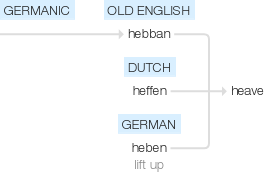Heave
Old English hebban, of Germanic origin; related to Dutch heffen and German heben ‘lift up’.
wiktionary
From Middle English heven, hebben, from Old English hebban, from Proto-West Germanic *habbjan, from Proto-Germanic *habjaną(“to take up, lift”), from Proto-Indo-European *kh₂pyéti, from the root *keh₂p-.
etymonline
heave (v.)
Old English hebban "to lift, raise; lift up, exalt" (class VI strong verb; past tense hof, past participle hafen), from Proto-Germanic *hafjan (source also of Old Norse hefja, Dutch heffen, German heben, Gothic hafjan "to lift, raise"), from PIE *kap-yo-, from root *kap- "to grasp." The sense evolution would be "to take, take hold of," thence "lift."
Related to have (Old English habban "to hold, possess"). Meaning "to throw" is from 1590s. Nautical meaning "haul or pull" in any direction is from 1620s. Intransitive use from early 14c. as "be raised or forced up;" 1610s as "rise and fall with alternate motion." Sense of "retch, make an effort to vomit" is first attested c. 1600. Related: Heaved; heaving. Nautical heave-ho was a chant in lifting (c. 1300, hevelow).
heave (n.)
1570s, from heave (v.). Meaning "a dismissal" is from 1944.
